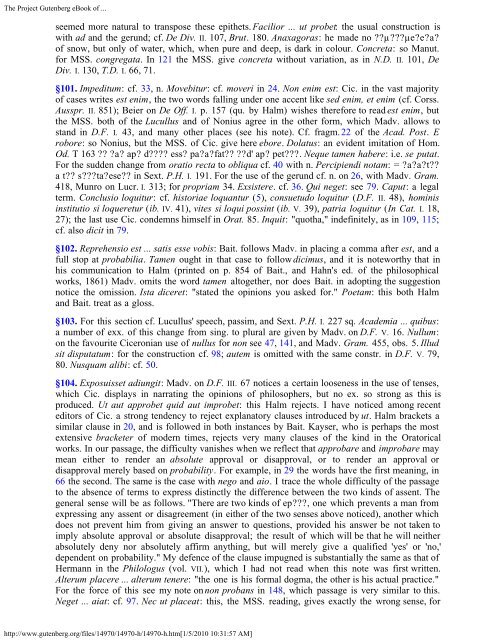academica of cicero. - 912 Freedom Library
academica of cicero. - 912 Freedom Library
academica of cicero. - 912 Freedom Library
Create successful ePaper yourself
Turn your PDF publications into a flip-book with our unique Google optimized e-Paper software.
The Project Gutenberg eBook <strong>of</strong> ...<br />
seemed more natural to transpose these epithets. Facilior ... ut probet: the usual construction is<br />
with ad and the gerund; cf. De Div. II. 107, Brut. 180. Anaxagoras: he made no ??µ???µe?e?a?<br />
<strong>of</strong> snow, but only <strong>of</strong> water, which, when pure and deep, is dark in colour. Concreta: so Manut.<br />
for MSS. congregata. In 121 the MSS. give concreta without variation, as in N.D. II. 101, De<br />
Div. I. 130, T.D. I. 66, 71.<br />
§101. Impeditum: cf. 33, n. Movebitur: cf. moveri in 24. Non enim est: Cic. in the vast majority<br />
<strong>of</strong> cases writes est enim, the two words falling under one accent like sed enim, et enim (cf. Corss.<br />
Ausspr. II. 851); Beier on De Off. I. p. 157 (qu. by Halm) wishes therefore to read est enim, but<br />
the MSS. both <strong>of</strong> the Lucullus and <strong>of</strong> Nonius agree in the other form, which Madv. allows to<br />
stand in D.F. I. 43, and many other places (see his note). Cf. fragm. 22 <strong>of</strong> the Acad. Post. E<br />
robore: so Nonius, but the MSS. <strong>of</strong> Cic. give here ebore. Dolatus: an evident imitation <strong>of</strong> Hom.<br />
Od. T 163 ?? ?a? ap? d???? ess? pa?a?fat?? ??d' ap? pet???. Neque tamen habere: i.e. se putat.<br />
For the sudden change from oratio recta to obliqua cf. 40 with n. Percipiendi notam: = ?a?a?t??<br />
a t?? s???ta?ese?? in Sext. P.H. I. 191. For the use <strong>of</strong> the gerund cf. n. on 26, with Madv. Gram.<br />
418, Munro on Lucr. I. 313; for propriam 34. Exsistere. cf. 36. Qui neget: see 79. Caput: a legal<br />
term. Conclusio loquitur: cf. historiae loquantur (5), consuetudo loquitur (D.F. II. 48), hominis<br />
institutio si loqueretur (ib. IV. 41), vites si loqui possint (ib. V. 39), patria loquitur (In Cat. I. 18,<br />
27); the last use Cic. condemns himself in Orat. 85. Inquit: "quotha," indefinitely, as in 109, 115;<br />
cf. also dicit in 79.<br />
§102. Reprehensio est ... satis esse vobis: Bait. follows Madv. in placing a comma after est, and a<br />
full stop at probabilia. Tamen ought in that case to follow dicimus, and it is noteworthy that in<br />
his communication to Halm (printed on p. 854 <strong>of</strong> Bait., and Hahn's ed. <strong>of</strong> the philosophical<br />
works, 1861) Madv. omits the word tamen altogether, nor does Bait. in adopting the suggestion<br />
notice the omission. Ista diceret: "stated the opinions you asked for." Poetam: this both Halm<br />
and Bait. treat as a gloss.<br />
§103. For this section cf. Lucullus' speech, passim, and Sext. P.H. I. 227 sq. Academia ... quibus:<br />
a number <strong>of</strong> exx. <strong>of</strong> this change from sing. to plural are given by Madv. on D.F. V. 16. Nullum:<br />
on the favourite Ciceronian use <strong>of</strong> nullus for non see 47, 141, and Madv. Gram. 455, obs. 5. Illud<br />
sit disputatum: for the construction cf. 98; autem is omitted with the same constr. in D.F. V. 79,<br />
80. Nusquam alibi: cf. 50.<br />
§104. Exposuisset adiungit: Madv. on D.F. III. 67 notices a certain looseness in the use <strong>of</strong> tenses,<br />
which Cic. displays in narrating the opinions <strong>of</strong> philosophers, but no ex. so strong as this is<br />
produced. Ut aut approbet quid aut improbet: this Halm rejects. I have noticed among recent<br />
editors <strong>of</strong> Cic. a strong tendency to reject explanatory clauses introduced by ut. Halm brackets a<br />
similar clause in 20, and is followed in both instances by Bait. Kayser, who is perhaps the most<br />
extensive bracketer <strong>of</strong> modern times, rejects very many clauses <strong>of</strong> the kind in the Oratorical<br />
works. In our passage, the difficulty vanishes when we reflect that approbare and improbare may<br />
mean either to render an absolute approval or disapproval, or to render an approval or<br />
disapproval merely based on probability. For example, in 29 the words have the first meaning, in<br />
66 the second. The same is the case with nego and aio. I trace the whole difficulty <strong>of</strong> the passage<br />
to the absence <strong>of</strong> terms to express distinctly the difference between the two kinds <strong>of</strong> assent. The<br />
general sense will be as follows. "There are two kinds <strong>of</strong> ep???, one which prevents a man from<br />
expressing any assent or disagreement (in either <strong>of</strong> the two senses above noticed), another which<br />
does not prevent him from giving an answer to questions, provided his answer be not taken to<br />
imply absolute approval or absolute disapproval; the result <strong>of</strong> which will be that he will neither<br />
absolutely deny nor absolutely affirm anything, but will merely give a qualified 'yes' or 'no,'<br />
dependent on probability." My defence <strong>of</strong> the clause impugned is substantially the same as that <strong>of</strong><br />
Hermann in the Philologus (vol. VII.), which I had not read when this note was first written.<br />
Alterum placere ... alterum tenere: "the one is his formal dogma, the other is his actual practice."<br />
For the force <strong>of</strong> this see my note on non probans in 148, which passage is very similar to this.<br />
Neget ... aiat: cf. 97. Nec ut placeat: this, the MSS. reading, gives exactly the wrong sense, for<br />
http://www.gutenberg.org/files/14970/14970-h/14970-h.htm[1/5/2010 10:31:57 AM]















